If you’ve ever wondered how many hours do nurses work a week, the short answer is this: most full-time nurses average 36 to 40 hours per week. But the reality is a little more complex. A nurse’s exact schedule depends on factors like their hospital, department, and whether they’re working 8-hour shifts, 12-hour shifts, or a mix of both.
Unlike the typical 9-to-5 routine found in many careers, nursing schedules are anything but standard. Nurses often work nights, weekends, and even holidays, since patient care is a 24/7 responsibility. These long, irregular hours can be challenging.
In this guide, we’ll break down:
- The typical nurse weekly schedule and how it compares to other jobs.
- Exactly how many hours are in a nursing shift (and why 12-hour shifts are so common).
- How schedules differ across departments, from the ER to outpatient clinics.
By the end, you’ll have a clearer picture of not only how many hours nurses work a week, but also why their schedules are designed the way they are.
How Many Hours Do Nurses Work in a Week?
1. Typical Nurse Weekly Schedule
When people imagine a nurse’s workweek, they often think of endless hours at the hospital — and while that’s partly true, the typical nurse weekly schedule is more structured than you might expect. It varies by role, department, and employment type.
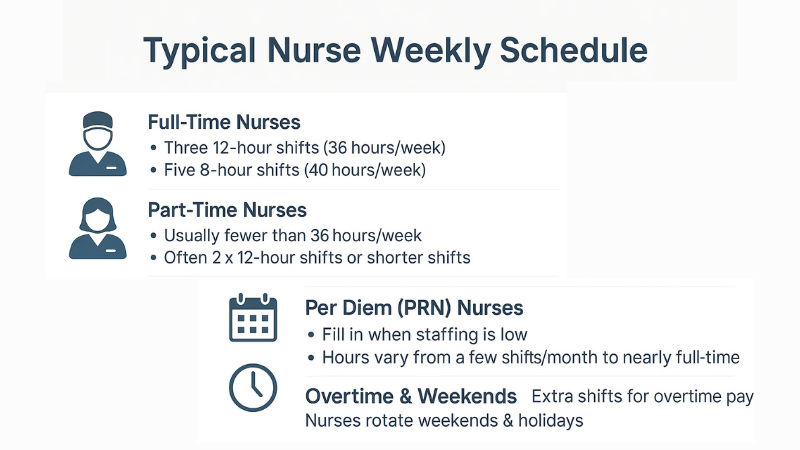
Full-Time Nurses
Most full-time nurses work one of two common schedules:
- Three 12-hour shifts (36 hours per week):
Popular in hospitals because they allow nurses to have four full days off, even though the shifts themselves are long and demanding.
- Five 8-hour shifts (40 hours per week):
More traditional and often found in clinics, outpatient centers, or doctor’s offices where care is scheduled during business hours.
As they have to stand all day during these shifts, many nurses are often seen wearing clogs. That’s simply choosing comfort and practicality over style. And it works well too.
Part-Time Nurses
Part-time schedules are usually fewer than 36 hours per week. Many part-time nurses work two 12-hour shifts or a combination of shorter shifts, which offers more flexibility for balancing family, school, or other commitments.
Per Diem or PRN Nurses
Per diem (also called PRN, “as needed”) nurses are the ultimate schedule-flex workers.
- They fill in when staffing is low or when regular staff are on vacation.
- Hours can range from a few shifts a month to nearly full-time, depending on availability and hospital needs.
- While less predictable, PRN roles often come with higher hourly pay to compensate for the lack of guaranteed hours.
Overtime and Weekend Rotations
Nursing is a 24/7 profession, which means overtime and weekend coverage are part of the job.
- Many nurses choose to pick up extra shifts for overtime pay, which can significantly boost their income.
- Most hospitals also require nurses to rotate weekends and holidays, ensuring that patient care never takes a day off.
In short, the typical nurse’s weekly schedule is flexible but demanding. Whether working 8- or 12-hour shifts, nurses balance long hours with fewer days worked.
2. How Many Hours Are in a Nursing Shift? Understanding the Worktime Models
One of the most common questions people ask when exploring a nursing career is: how many hours are in a nursing shift? Unlike traditional office jobs that follow a set 9-to-5 routine, nursing shifts are designed around continuous patient care. Since hospitals and healthcare facilities run 24/7, nurses must cover mornings, evenings, nights, weekends, and holidays.
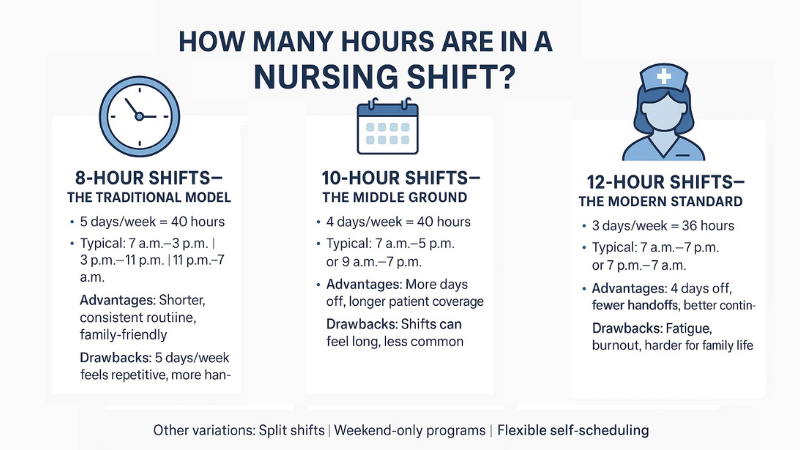
The three most common shift lengths are 8-hour, 10-hour, and 12-hour shifts, but some facilities even experiment with unique hybrid models. Let’s look at each in detail.
8-Hour Shifts – The Traditional Model
For decades, the 8-hour shift was considered the standard in nursing. Nurses typically worked five days per week, covering a total of 40 hours.
- Typical hours: Day (7 a.m.–3 p.m.), Evening (3 p.m.–11 p.m.), or Night (11 p.m.–7 a.m.).
- Where you’ll find it: Clinics, outpatient care, schools, and some hospitals still use this model.
- Advantages:
- Shorter, more manageable shifts.
- Consistent daily routine.
- Easier to balance with family life, especially for parents with young children.
- Drawbacks:
- Requires working five days per week, which can feel repetitive.
- Nurses may experience “shift handover fatigue” since patient care changes hands more frequently compared to longer shifts.
10-Hour Shifts – The Middle Ground
Though not as common, some facilities schedule 10-hour shifts as a compromise between the 8- and 12-hour models. Nurses usually work four shifts per week, totaling 40 hours.
- Typical hours: Can vary (e.g., 7 a.m.–5 p.m. or 9 a.m.–7 p.m.).
- Where you’ll find it: Specialty clinics, perioperative units, or departments that prefer longer coverage but want to avoid 12-hour fatigue.
- Advantages:
- More days off compared to 8-hour shifts.
- Provides longer daily coverage for patient continuity.
- Less tiring than full 12-hour days.
- Drawbacks:
- Shifts can feel long, especially during busy or stressful days.
- Scheduling consistency may vary depending on staffing needs.
12-Hour Shifts – The Modern Standard
Today, the 12-hour shift dominates hospitals, especially in acute care and high-demand departments like ER, ICU, and Med-Surg. Nurses typically work three shifts per week, totaling 36 hours, which is considered full-time.
- Typical hours: Day shift (7 a.m.–7 p.m.) or Night shift (7 p.m.–7 a.m.).
- Advantages:
- Fewer workdays — only three per week — which means more consecutive days off. Many nurses enjoy having four full days for rest, family, or even a second job.
- Longer shifts reduce the number of handoffs, improving continuity of patient care.
- Popular among younger nurses who prefer blocks of free time.
- Drawbacks:
- Physically and mentally exhausting, especially during back-to-back shifts.
- Long hours on your feet can increase risks of burnout, fatigue, and musculoskeletal issues.
- Less family-friendly for parents with young children since the entire day is consumed by work.
Other Scheduling Variations
While 8-, 10-, and 12-hour shifts are most common, some facilities experiment with alternative schedules:
- Split shifts:
Two shorter shifts in one day, though not widely used in nursing.
- Weekend-only programs:
Some nurses work two 12-hour weekend shifts and receive full-time pay.
- Flexible self-scheduling:
Many hospitals now allow nurses to sign up for preferred shifts, offering more control over work-life balance.
Balancing Flexibility and Fatigue
So, how many hours are in a nursing shift? Anywhere from 8 to 12 hours, depending on the facility and department. While 12-hour shifts are now the norm in many hospitals, some nurses prefer the stability of 8-hour days, while others thrive on the balance of 10-hour schedules.
Each option comes with trade-offs:
- 8-hour shifts = more days worked, but shorter hours.
- 10-hour shifts = balance of time and rest, but less common.
- 12-hour shifts = fewer workdays, but greater fatigue.
At the end of the day, the “best” shift depends on your lifestyle, family needs, and personal stamina. Choosing the right shift length isn’t just about clocking hours; it’s about finding a schedule that lets you care for your patients and yourself.
3. Do Nurses Work 12-Hour Shifts Every Week?
If you’re exploring nursing as a career, one of the biggest questions you’ll hear is: do nurses work 12-hour shifts every week? The short answer is no — not every nurse works this schedule. However, in many hospitals, especially in acute care settings, 12-hour shifts have become the norm.
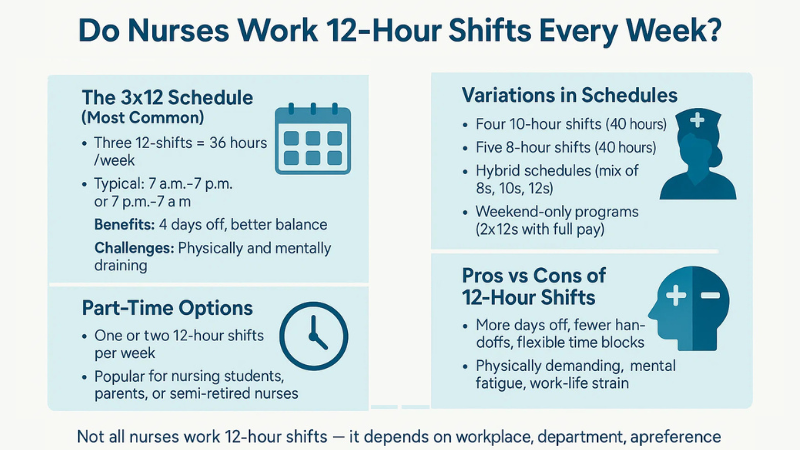
Let’s break it down.
The 3×12 Schedule (Most Common)
Many full-time hospital nurses follow what’s known as a 3×12 schedule — three 12-hour shifts per week, totaling 36 hours. Even though this is technically fewer hours than a standard 40-hour workweek, it’s still considered full-time.
- Typical schedule: 7 a.m.–7 p.m. (day shift) or 7 p.m.–7 a.m. (night shift).
- Benefits: Four days off per week, which gives nurses longer breaks for family time, travel, or rest.
- Challenges: Each shift is physically and mentally draining, especially when scheduled back-to-back.
Variations in Schedules
Not all nurses work strict 12-hour shifts every week. Some facilities or units offer alternatives:
- Four 10-hour shifts – A total of 40 hours, giving nurses three days off.
- Five 8-hour shifts – More traditional, still common in clinics, outpatient centers, and schools.
- Hybrid schedules – A mix of 8s, 10s, and 12s depending on staffing needs.
- Weekend-only programs – Some nurses work two 12-hour weekend shifts and receive full-time pay.
This flexibility allows nurses to find a schedule that fits their lifestyle, though hospitals often lean on 12-hour shifts for coverage efficiency.
Part-Time Options
Many nurses prefer part-time schedules, working one or two 12-hour shifts per week. This setup is especially popular for:
- Nursing students.
- Parents balancing childcare.
- Nurses easing into retirement.
Part-time 12s provide steady income and hospital experience without the full-time commitment.
Pros of 12-Hour Shifts
- More consecutive days off – A huge perk for work-life balance.
- Fewer handoffs – Longer shifts reduce the number of shift changes, improving patient continuity.
- Flexible blocks of time – Some nurses even pick up extra shifts on off-days for overtime pay.
Cons of 12-Hour Shifts
- Physically demanding – Being on your feet for 12 hours takes a toll on the body.
- Mental fatigue – Long shifts increase the risk of errors, especially overnight.
- Work-life strain – While days off are nice, the actual workdays can consume nearly the entire day, leaving little time for family or personal life.
The Bottom Line
So, do nurses work 12-hour shifts every week? Not always. If you fall in this category, you must take proper steps to prevent foot pain during these shifts. While 12-hour shifts are the standard in many hospital systems, they aren’t universal. Clinics, outpatient centers, schools, and specialized departments often stick to 8- or 10-hour schedules.
For hospital nurses, however, the 12-hour shift is common because it balances staffing efficiency, patient continuity, and time off — even if it comes with challenges like fatigue and burnout.
In the end, whether you work 12-hour shifts every week depends on your workplace, department, and personal preference.
4. Average Work Hours for Hospital Nurses
When people ask about the average work hours for hospital nurses, the standard answer is 36 to 40 hours per week. But in reality, a nurse’s schedule is often far from “average.” Hospital staffing needs, patient demands, and nurse availability all influence how many hours a nurse works in a given week.
So to stay active, you need to have the most comfortable shoes with you. If you don’t have the right footwear on, then you are bound to face burnout from wearing the wrong footwear all day long
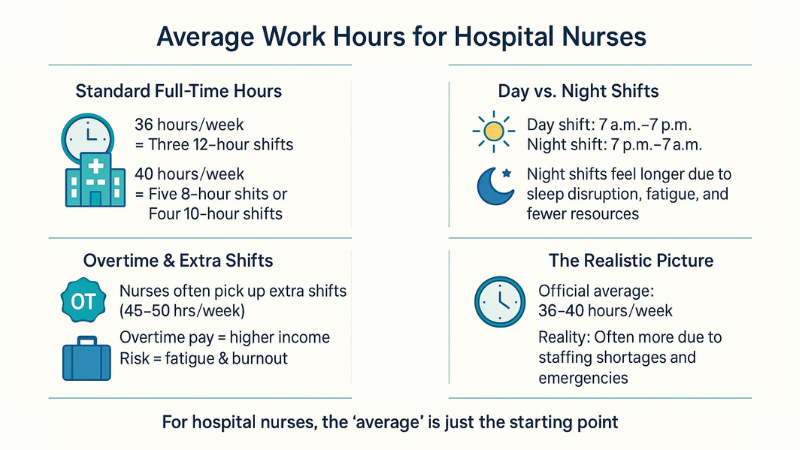
Confused which ones to get? Don’t worry, we’ve got the best nursing shoes for you that ensure proper comfort and durability, perfect for those long shifts you have to attend
Standard Full-Time Hours
- 36 hours per week – Typically worked as three 12-hour shifts, the most common schedule in modern hospitals.
- 40 hours per week – Usually structured as five 8-hour shifts or four 10-hour shifts, depending on the facility.
These schedules cover what’s considered “full-time” employment, though the actual time spent on the job can feel longer once you factor in preparation, charting, and shift handoffs.
Day vs. Night Shifts
Hospital nurses can work either day shifts (7 a.m.–7 p.m.) or night shifts (7 p.m.–7 a.m.). While the scheduled hours are the same, night shifts often feel longer because of:
- Disrupted sleep cycles.
- Increased fatigue from working against the body’s natural rhythm.
- Limited access to support staff or resources compared to daytime.
Night-shift nurses often say their 36-hour workweek feels closer to 50 in terms of exhaustion.
Overtime and Extra Shifts
Hospitals frequently face staffing shortages, and nurses often step in to cover. That means:
- Overtime pay is common, especially for weekend or holiday shifts.
- Some nurses regularly log 45–50 hours a week by adding an extra shift.
- Picking up overtime can boost income but also raises the risk of burnout.
Travel Nurses and Short-Term Contracts
Travel nurses — who take temporary assignments in different hospitals — often work more intense schedules, sometimes 48 hours or more per week. These packed schedules are offset by higher pay rates and the temporary nature of contracts, but they can be physically demanding.
The Realistic Picture
So, while the average work hours for hospital nurses officially fall in the 36–40 range, the reality is that many nurses work well beyond that. Extra shifts, emergencies, and staffing shortages often push weekly hours higher.
For hospital nurses, the “average” is just the starting point — their actual workload depends on shift type, department, and personal willingness to pick up overtime.
5. Nurse Work Schedule Explained by Department
Not all nurses work the same hours. In fact, one of the fascinating things about nursing is how much the schedule changes depending on the unit. When you look at the nurse work schedule explained by the department, you’ll see just how diverse the profession really is.
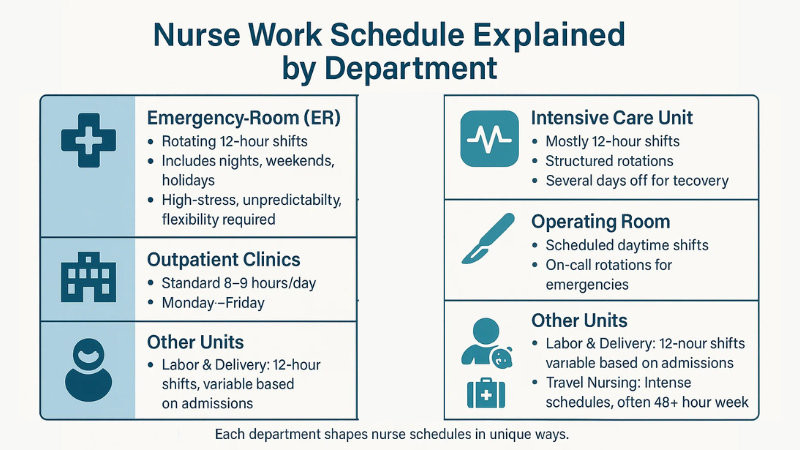
Emergency Room (ER) Nurses
The ER never sleeps, which means nurses here often work rotating 12-hour shifts that include nights, weekends, and holidays. Because emergencies are unpredictable, schedules can be high-stress and constantly changing. Nurses may be called in to cover sudden surges of patients after accidents, disasters, or flu season spikes.
Intensive Care Unit (ICU) Nurses
ICU patients require constant, complex monitoring. Most ICU nurses also work 12-hour shifts, but the rotations are more structured and consistent than in the ER. While physically and emotionally demanding, ICU schedules often allow nurses to have several consecutive days off.
Outpatient Clinic Nurses
For those who prefer stability, outpatient clinics offer the most “traditional” schedule. Nurses typically work standard business hours, around 8–9 hours per day, Monday through Friday. That means no nights, weekends, or holidays in most cases. This makes clinic nursing a popular choice for work-life balance.
Operating Room (OR) Nurses
OR nurses usually have scheduled daytime shifts, but here’s the catch: most are also placed on on-call rotations. That means even on days off, they may need to come in for emergency surgeries at night or on weekends. OR schedules can be structured but unpredictable.
Other Specialized Units
- Labor & Delivery (L&D): Around-the-clock care, usually 12-hour shifts, with high variability depending on patient admissions.
- Pediatrics: Mix of shifts, often designed to be more family-friendly, though night and weekend coverage is still required.
- Travel Nursing: Flexible but often more intense schedules — sometimes 48+ hours per week to meet contract demands.
As you can see, the nurse work schedule explained by the department shows that no two nursing roles look exactly the same. Whether it’s the adrenaline-fueled pace of the ER, the steady rhythm of outpatient care, or the unpredictable demands of the OR.
6. Factors That Influence Nurse Work Hours
When it comes to nursing, no two schedules are exactly alike. While most nurses fall into the typical 36–40 hour workweek, the reality is that a wide range of factors influence nurse work hours. Everything from hospital staffing to location can play a role in how long a nurse spends on the job.
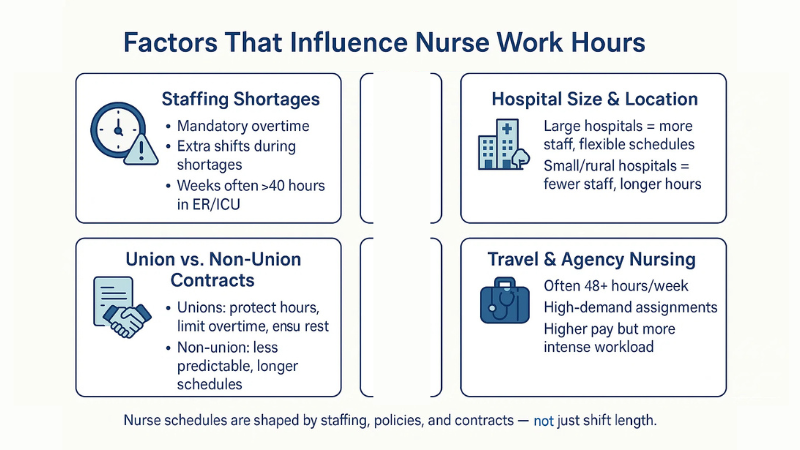
1. Staffing Shortages
One of the biggest reasons nurses end up working longer hours is short staffing. Hospitals that don’t have enough nurses to cover shifts may require employees to stay late or work mandatory overtime. In critical situations, nurses may even be called in on their days off. This can lead to weeks that stretch well beyond 40 hours.
2. Hospital Size & Location
Where a nurse works also matters.
- Large urban hospitals usually have more staff available, which means greater flexibility in scheduling and less mandatory overtime.
- Smaller rural hospitals, on the other hand, may have fewer nurses on staff, meaning each nurse must cover more shifts. In these cases, nurses often find themselves working longer hours and taking on multiple roles.
3. Union vs. Non-Union Contracts
Unionized nurses typically have clear protections in place when it comes to scheduling. These contracts often:
- Limit the number of hours a nurse can be required to work in a single week.
- Restrict mandatory overtime.
- Ensure rest periods between shifts.
Non-union hospitals, however, may not have the same safeguards. This means nurses could face longer, less predictable schedules depending on hospital needs.
4. Travel & Agency Nursing
For nurses working through agencies or as travel nurses, hours can look very different. These roles often involve:
- Longer weekly commitments (sometimes 48+ hours) due to contract requirements.
- More demanding schedules during staffing crises.
- Intense workloads balanced by higher pay and the opportunity to work in different locations.
The Bottom Line
When you look closely at the factors that influence nurse work hours, it’s clear that schedules aren’t just determined by shift length. Staffing levels, hospital policies, location, and even the type of contract all play a role in how many hours a nurse actually works in a given week.
For many nurses, flexibility is limited. But understanding these factors helps explain why some weeks feel manageable while others push well past “average.”
7. Work-Life Balance Challenges for Nurses
Nursing is one of the most rewarding careers, but the long and irregular hours often come with a price: finding a healthy work-life balance. Beyond the demanding shifts, nurses juggle physical strain, disrupted sleep, and the challenge of maintaining a personal life.
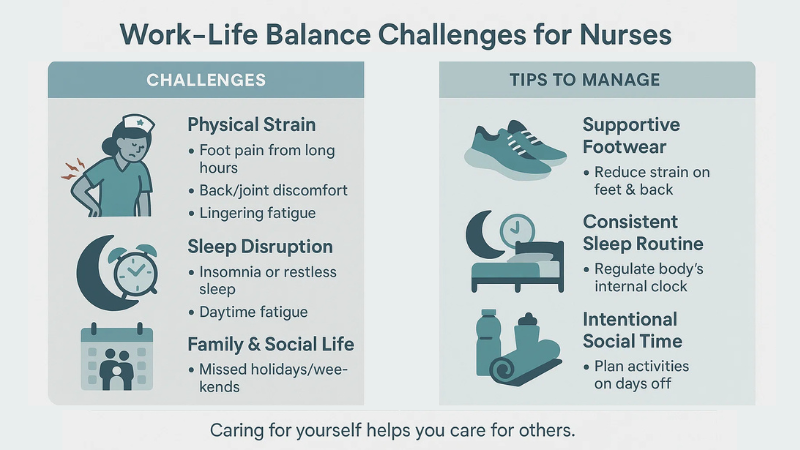
Physical Strain
Spending 12+ hours on your feet can take a serious toll on the body. Many nurses experience:
- Foot pain from standing or walking long distances.
- Back and joint discomfort from lifting patients or equipment.
- Fatigue that lingers even after a shift ends.
Without proper recovery, these issues can build up over time and lead to chronic pain.
Sleep Disruption
Night shifts and rotating schedules can wreak havoc on a nurse’s circadian rhythm. Switching between day and night shifts makes it hard to establish healthy sleep patterns, leading to:
- Insomnia or restless sleep.
- Daytime fatigue.
- Increased risk of burnout.
Getting quality rest becomes just as important as the hours worked.
Family & Social Life
Nurses often miss out on evenings, weekends, and holidays with family and friends. Rotating schedules make it harder to:
- Maintain a consistent family routine.
- Attend social events.
- Balance childcare responsibilities.
This can leave nurses feeling isolated, even when surrounded by coworkers and patients.
Tips for Managing Recovery Days
Finding balance isn’t always easy, but small adjustments can make a big difference:
- Invest in comfortable, supportive footwear to reduce strain on your feet and back.
- Stick to a consistent sleep routine, even on days off, to help regulate your body’s clock.
- Prioritize recovery with stretching, light exercise, proper hydration, and balanced nutrition.
- Plan social or family time intentionally around your days off, so you don’t feel like work is taking over your life.
While the work-life balance challenges for nurses are real, they can be managed with the right strategies. Taking care of your own well-being ensures you have the energy and focus to care for others.
Comparison Chart: 8-Hour vs 10-Hour vs 12-Hour Shifts
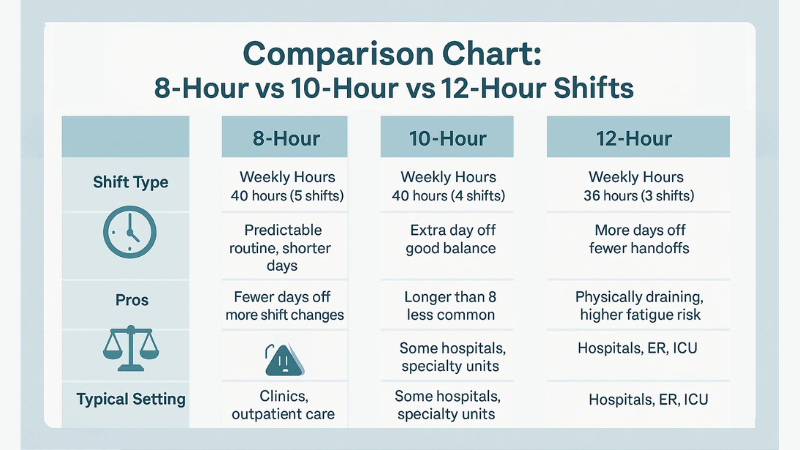
Conclusion
So, how many hours do nurses work a week? For most full-time nurses, the answer falls between 36 and 40 hours. But the real story is more nuanced. Schedules vary widely depending on the department, the hospital’s policies, and whether shifts are structured in 8s, 10s, or the more common 12-hour blocks.
While 12-hour shifts have become the standard in many hospitals, not every nurse works them, and those in outpatient clinics or part-time roles often enjoy more traditional hours. This flexibility is one of the unique aspects of nursing.
Of course, those long shifts can come with challenges. Physical strain, disrupted sleep, and limited family time are common struggles, making recovery strategies and supportive footwear more than just nice-to-haves — they’re necessities.
FAQs: How Many Hours Do Nurses Work a Week
How many hours do nurses usually work in a week?
Most nurses work 36–40 hours per week, though overtime can increase this number.
Are 12-hour shifts mandatory for nurses?
No, but many hospitals use 12-hour shifts as the standard for full-time nurses.
Do nurses work more than 40 hours a week?
Yes, many nurses take overtime shifts or work per diem roles, pushing weekly hours above 40.
Which nursing departments have the longest hours?
ER, ICU, and OR nurses often face the longest and most unpredictable schedules.
What is the most flexible nursing schedule?
Outpatient and clinic nursing usually offers the most regular daytime hours.

Leave a Reply